2022 年浙江温州中考英语试题及答案
一、单项填空(本题有 10 小题,每小题 1 分,共 10 分)
请从 A、B、C、D 四个选项中选出可以填入空白处的最佳答案。
1. Ben watched Tom and Jerry yesterday. ________ cartoon made him laugh.
A. A
B. An
C. The
D. /
2. Everybody, please keep ________. It’s not allowed to make any noise in the reading
room.
A. fit
B. warm
C. dry
D. quiet
3. —Jack, I have no idea for the report.
—Me neither. Why don’t we ask the teacher for ________?
A. help
tickets
B. jokes
C. food
D.
4. There was a storm yesterday. ________, most of the flowers in my garden are still
alive.
A. Clearly
Firstly
B. Luckily
C. Suddenly
D.
5. —Thomas, where are my postcards? I ________ find them.
—They’re on the bookshelf.
A. can’t
shouldn’t
B. needn’t
C. mustn’t
D.
6. —Mum, may I have more chocolate?
—You’d better not ________ too much sweet food is bad for health.
A. until
because
B. while
C. although
D.
7. In China, people usually ________ their houses to sweep away bad luck before Spring
Festival.
A. clean up
B. look up
C. make up
D. put up
8. —Lydia, have you decided which city to travel to, London or New York?
—Not yet. Maybe I ________ London to meet my friends this time.
A. visit
visiting
B. visited
C. will visit
D. was
9. —Nancy, do you know ________?
—In 1957, I think.
�
A. who wrote the play Teahouse
C. when the play Teahouse was written
B. what the play Teahouse is about
D. why Lao She wrote the play
Teahouse
10. —Dad, we’ll play against s strong team in tomorrow’s football match.
—________! Just try your best!
A. Good idea
B. Come on
C. Thank you
D. Wait a
minute
二、完形填空(本题有 15 小题,每小题 1 分,共 15 分)
阅读下面短文,掌握大意,然后从每小题所给的 A、B、C、D 四个选项中选出最佳选项。
Matt loved science, and he wanted to be the Science Star of the week. Now he
was presenting his experiment in Mrs. Perry’s class.
“Let me show you ____11____ to keep an egg in the middle of the glass.” Matt
dropped an egg into salt water. But it fell to the bottom.
“Look, Matt’s blushing!” Coco shouted. Matt, covered ____12____ red face with
hands.
That evening he ____13____ TheBookofWonderfulScienceExperiments. When it
came to the last page, he smiled. “This is the right experiment ____14____ me! It’s
impossible to fail this time.”
The next day in front of his class, Matt spread small pieces of paper onto the
desk and rubbed a spoon with cloth. “The spoon will lift up the paper.” He raised
the spoon, but ____15____ happened. The paper lay still.
“Matt’s blushing again!” Emily pointed out. Matt was ____16____ and ran back
to his seat with his red face.
“Becoming the Science Star seems so ____17____,” Matt thought. That night he
couldn’t sleep, “I have to make it, but the only thing I could do right was
blushing.” … Suddenly, a ____18____ came to his mind.
The following morning, Matt appeared before the class again, ____19____ his
Mickey Mouse ears.
�
“Mouse ears on the head are your ____20____?” Someone laughed and Matt’s face
burned.
“No, watch my ____21____! Blushing is my experiment,” Matt answered. Everyone
quieted down.
Matt continued, “When you feel stressed, your blood vessels in the face open
wide and fill the skin with blood, ____22____ you blush.” He showed a picture of
blood vessels. “I’ve ____23____ many times to control blushing, but now I know
it’s a normal part of being human. So the best thing to do is to ____24____ it.”
The class cheered and Matt’s red face lit up the whole classroom.
“Matt is the Science Star of the week,” Mrs. Perry announced. Matt walked
____25____ back to his seat. What a perfect day!
11. A. how
12. A. my
13. A. handed in
away
B. where
B. your
C. why
C. his
B. looked through
C. waited for
D. when
D. her
D. put
14. A. for
B. with
C. against
D. like
15. A. something
B. anything
C. everything
D.
nothing
16. A. happy
B. nervous
17. A. difficult
B. common
18. A. question
B. number
mistake
C. calm
C. natural
C. plan
19. A. passing
B. throwing
C. wearing
D. bored
D. safe
D.
D.
D.
D. back
D. but
D. cried
D. accept
repairing
20. A. play
experiment
21. A. hands
22. A. whether
23. A. tried
24. A. finish
25. A. secretly
worriedly
B. song
C. painting
B. face
B. so
B. advised
B. change
C. teeth
C. unless
C. guessed
C. hide
B. strangely
C. proudly
D.
三、阅读理解(本题有 15 小题。第 26—28 小题,每小题 1 分;第 29—39 小题,每小题 2
�
分;第 40 小题 5 分。共 30 分)
阅读下面短文,第 26—39 小题从所给的 A、B、C、D 四个选项中选出最佳选项,第 40 小题
在答题纸规定区域作答。
A
Good photographers are like reporters. They record people’s lives with cameras.
They are also like artists or writers. Their photos can make people think or feel
something.
•Fashion photographers mainly take pictures of
new products like clothes.
•Portrait photographers take photos of different
people.
•Landscape photographers usually take pictures
outdoors in nature.
•Event photographers take photos of big parties
and ceremonies.
•Robert Doisneau was French. He
was well-known for his black and
white street photos of Paris.
•Anne Geddes was born in
Australia. Taking baby pictures
has made her world-famous.
•Richard Avedon was from the USA.
He mainly took photos of fashion
and famous people. His photos
helped develop a new style for
photography.
26. The passage mainly introduces information about ________.
A. artists
B. writers
C. reporters
D.
photographers
27. Landscape photographers take photos of ________.
A. big parties
B. outdoor sights
C. new clothes
D.
different people
28. From the passage, we know that Anne Geddes ________.
A. is from France
B. is famous for baby pictures
C. takes street photos
D. helps develop a new style
�
B
“Motasharefon bema’ refatek!” is often heard in Arabs’ daily talks. This
greeting in the language Arabic means “Nice to meet you!” You may find Arabic
difficult to understand, but the following facts can offer you some basics.
Arabic is s language of over twenty countries across the Middle East and North
Africa, It’s also one of the six official languages of the UN. Now about 400 million
people worldwide speak Arabic.
Arabic has different varieties. One of them is Modern Standard Arabic. It is
taught at schools in all Arabic-speaking countries and used formally over media.
Colloquial Arabic is another variety which people in the Arab world usually use in
their everyday life.
Arabic is written from right to left in a beautiful and flowing script. Written
Arabic is formed from eighteen different curves with dots (
) above or below. The
curve (
) with one dot below is pronounced /b/, two on top is /t/, and three on
top is /th/, while the curve (
) with two dots below is pronounced /y/.
A main feature of Arable is the throe letter root system. Almost every Arabic
word is based on a root of three letters. If you take a root and add other letters
to it, you can create many words related to the meaning of that root. For example,
“k-t-b” is a common root in Arabic. Some words from that root are kitaab(“book”)
and maktaba (“library”).
There are more facts about Arabic for you to explore. You’ll find that learning
about it helps open up door to a different culture and provides a new way of thinking
about the world.
29. How many varieties of Arabic are mentioned in the passage?
A. Two.
B. Three.
C. Four.
D. Five.
30. According to the passage, which of the following is pronounced /b/ in Arabic?
A.
B.
C.
D.
�
31. What does the underlined root “k-t-b” in Paragraph 5 most probably mean?
A. Cooking.
B. Singing.
C. Writing.
D.
Swimming.
32. Why does the author write this passage?
A. To introduce the language Arabic.
B. To tell stories from Arab countries.
C. To encourage people to visit Arab countries.
D. To advise people to protect the language Arabic.
C
Scientists are looking for ways that we can effectively use the light and heat
from the sun. One idea that has caught their imagination is solar roads. They are
expected to produce clean and renewable energy.
With solar panels on the surfaces, solar roads cost more than traditional roads.
However, besides the functions of traditional roods, they have the panels to receive
sunlight and change it into the energy to supply power to homes, factories and street
lighting. There are four layers in a solar panel:
•Base layer: It is made of insulation material and forms a good grip with the
road below this layer.
•Middle layer: This is the most important layer. It holds all kinds of power
lines connecting all the solar parts in the panel, like LED lights and the heating
system.
•Top layer: This layer is super-strong glass. It allows the panel to hold the
weight of the heaviest vehicles.
•Capping: This is the topmost layer used to offer extra protection to the solar
parts in the panel. The layer must be rough enough to provide the traction for the
safety of vehicles.
�
With the smart design, solar roads can successfully charge the vehicles on them.
And the roads have inbuilt LED lights to replace the traditional rood signs and lines,
which are usually painted and harmful to humans. What’s more, the heating systems
in the solar roads can take care of the snow and ice on the roads for drivers.
Test solar roads have been built in several countries (France, China, USA, etc.)
since 2014. The first word solar road project, Metrics of Watt Way in France, was
set up by a French company called Construction Colas. It was an example of low
effectiveness. In the first year, it had been expected to produce around 767 kWh
of energy a day, but it only produced 409 kWh. Even so, the production could increase
with design improvements. Of course, more time is needed before this technology is
put into use.
Solar roads may not be widely used in the near future, but they are indeed great
for an environment-friendly and energy-saving world.
33. Solar roads ________.
A. offer power to homes
B. get energy from factories
C. keep the sunlight away
D. cost less than traditional roods
34. Which of the following about the layers of a solar panel is TRUE according to
the passage?
A. The base layer is the most important layer.
B. There are many power lines in the middle layer.
C. The top layer lies on the top of the solar panel.
D. The capping should be smooth enough for drivers.
35. The first world solar road project ________.
A. was set up in China in 2014
B. showed high effectiveness as
expected
C. was started by a US company
D. could get better with design
improvements
36. What is the best title for the passage?
A. Solar Roads: A Widely Used Invention
B. Solar Roads: A Safety Guard for Drivers
C. Solar Roads: A New Idea for Clean Energy
D. Solar Roads: A Way to Produce LED Lights
D
Hearing that Erin was coming for the silver wedding party, Mr. Joe and his wife
�
got worried.
“Erin the thief!” said Mr. Joe to his wife. “Anything smaller than a table,
and more expensive than paper, would finally be found in his bag.”
“He’s sure to come for the presents we’ve received,” added Mrs. Joe. “We
can’t hide them all. How can we deal with him?”
“We must keep an eye on him,” said Mr. Joe.
As soon as Erin arrived, the couple started to keep a sharp lookout. After dinner,
the three talked nervously from one boring topic to another in the living room.
Suddenly, Erin asked, “You’ve got so many presents. Can I take a look at those
pretty silk scarves?”
“Only it’s annoying to have seven of them,” Mr. Joe blurted.
Erin studied the scarves carefully, lost in thought. The couple got more anxious.
After Erin went for sleep, Mrs. Joe counted the presents immediately. “I’m
not sure if we’ve lost anything,” she doubted.
“He must have taken something,” claimed Mr. Joe angrily. “The awful pig
hasn’t brought us a present. How dare he take anything from us?”
“Let’s go through his bag late at night,” Mrs. Joe suggested.
The search was a short one. They found a silk scarf carefully placed in the bag.
Mrs. Joe quickly picked it up and put it into her pocket.
The next morning, Erin was late for breakfast. “Something’s been taken out
of my bag,” he said. “It was a present I had prepared for your silver wedding,
only it happened to be a scarf. You seemed annoyed at having so many, so I thought
I’d get it changed, but now it’s gone.”
The couple turned deadly pale. Mrs. Joe ran to the living room and surprisingly,
she found their seven scarves were still there,
▲ .
Mrs. Joe returned with Erin’s scarf. “This one is yours,” she went on. “It’s
an unpleasant thing to say… Actually, we took it last night. It all started because
there were some unkind words about you. It’s really shameful to go through your
bag without asking.”
Erin’s eyes widened as he was listening. Mrs. Joe handed the scarf to Erin.
“Please take your scarf back. It’s unfair to you. Really hope you can forgive
us for everything we did,” Mr. Joe said.
Erin refused the scarf with a smile. “It has always been for you. Please keep
it. Just want you to know that people change.”
�
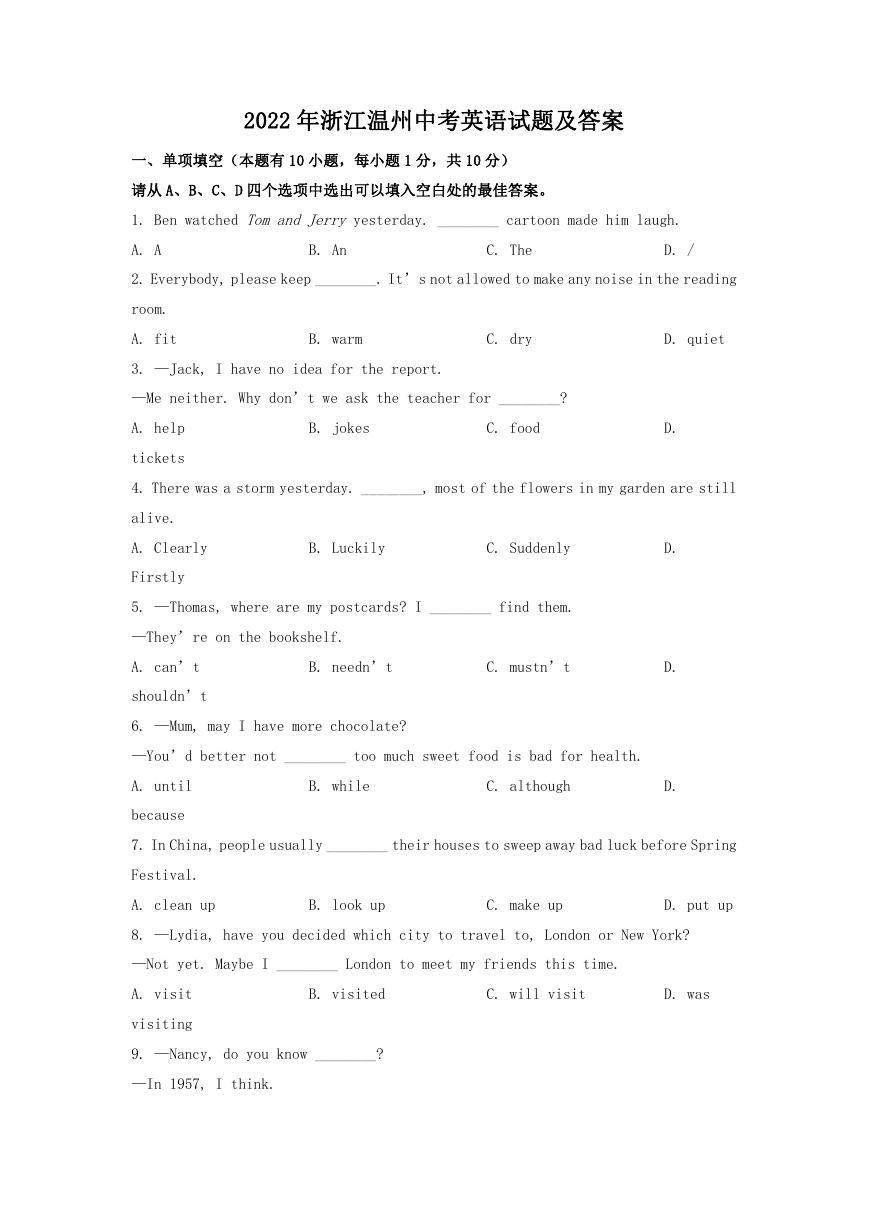
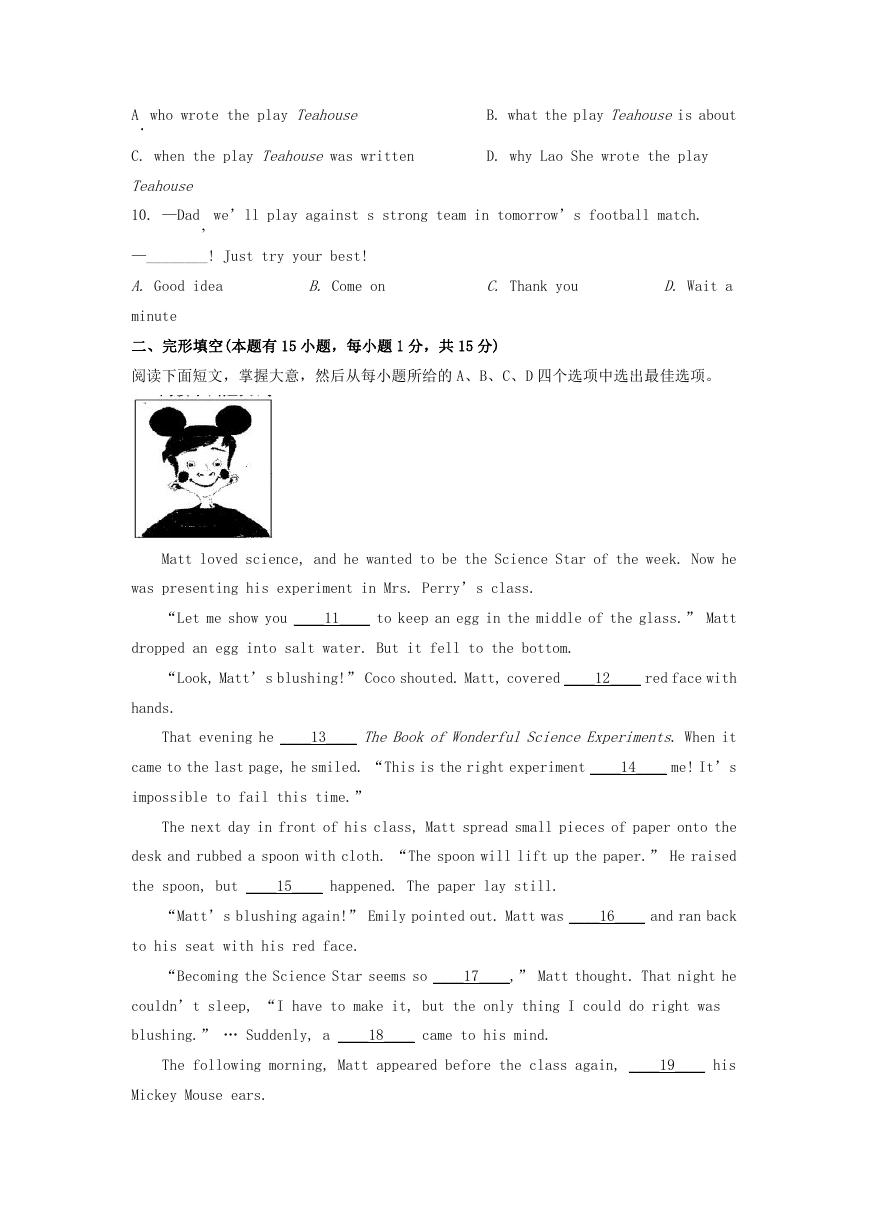
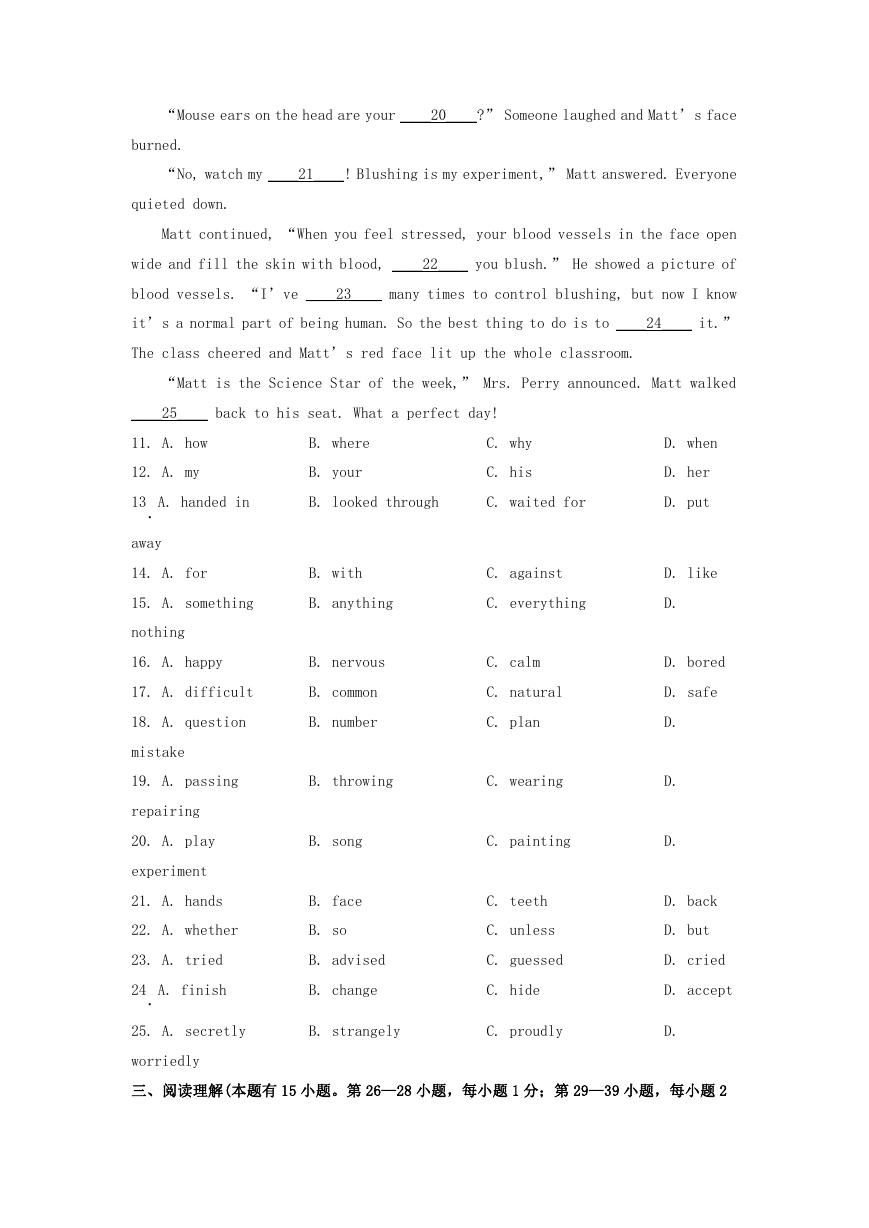

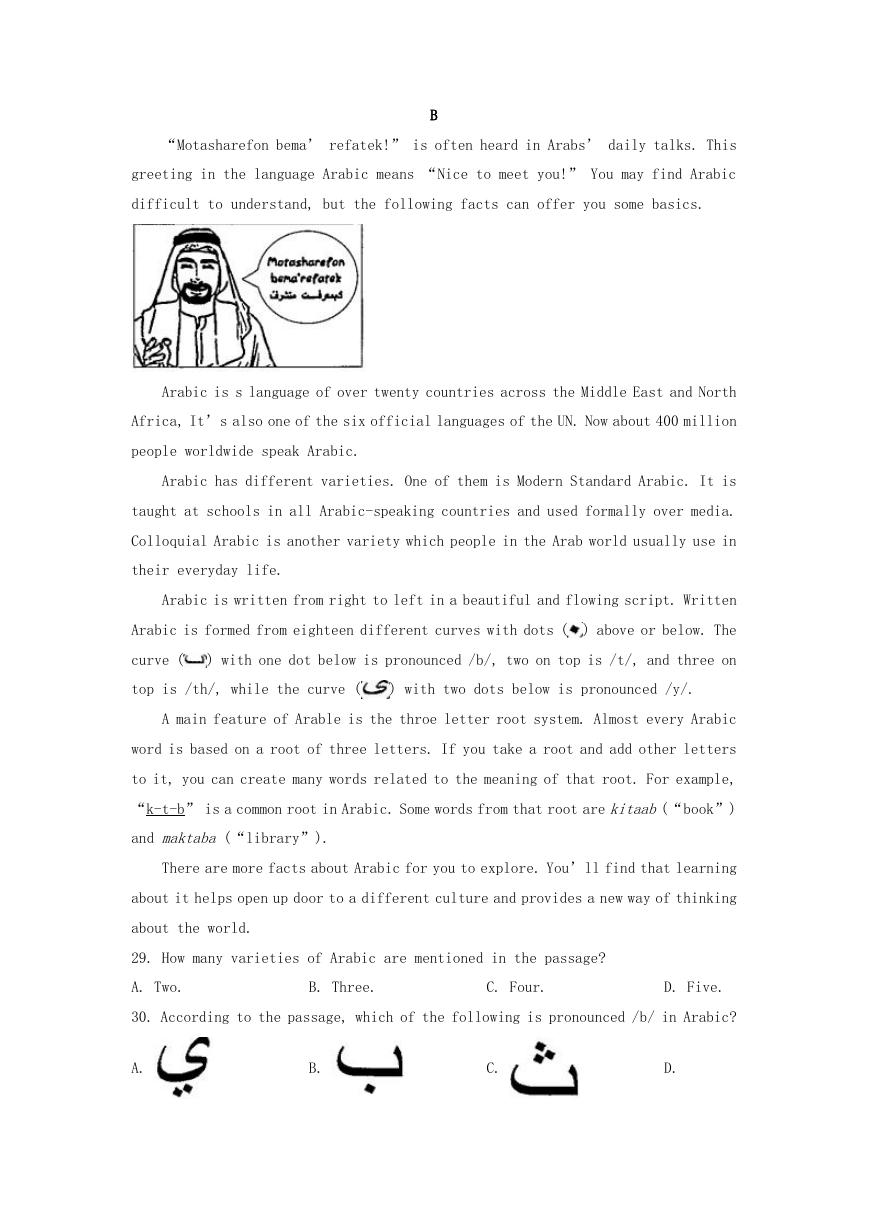
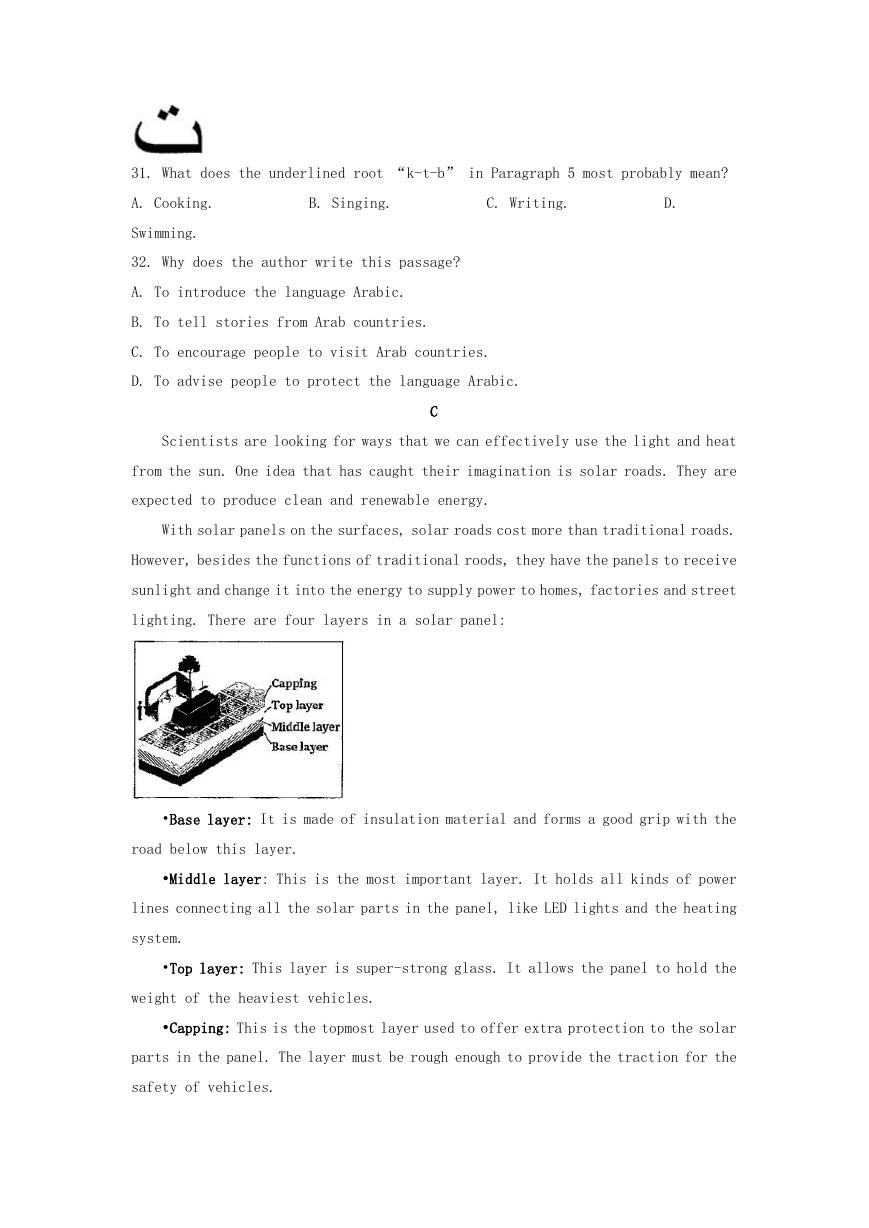
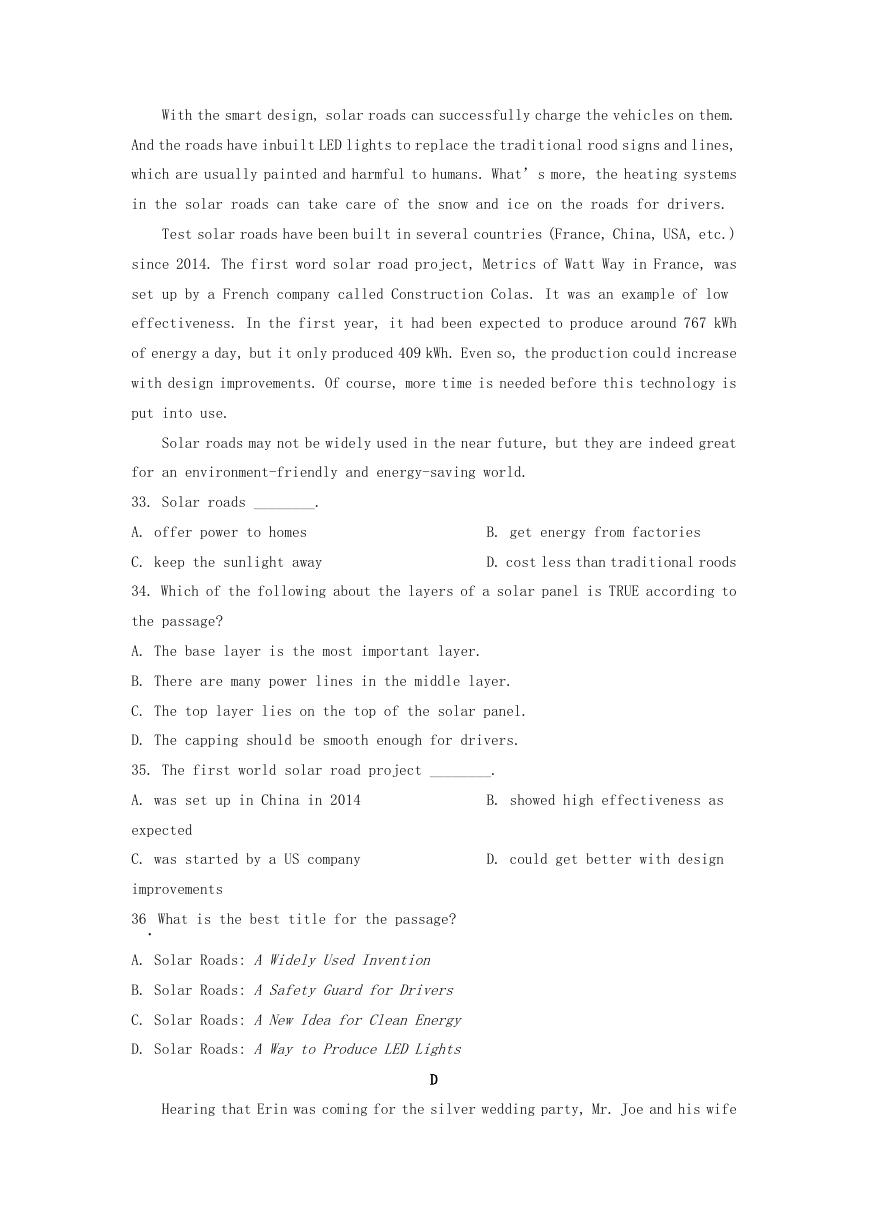









 2023年江西萍乡中考道德与法治真题及答案.doc
2023年江西萍乡中考道德与法治真题及答案.doc 2012年重庆南川中考生物真题及答案.doc
2012年重庆南川中考生物真题及答案.doc 2013年江西师范大学地理学综合及文艺理论基础考研真题.doc
2013年江西师范大学地理学综合及文艺理论基础考研真题.doc 2020年四川甘孜小升初语文真题及答案I卷.doc
2020年四川甘孜小升初语文真题及答案I卷.doc 2020年注册岩土工程师专业基础考试真题及答案.doc
2020年注册岩土工程师专业基础考试真题及答案.doc 2023-2024学年福建省厦门市九年级上学期数学月考试题及答案.doc
2023-2024学年福建省厦门市九年级上学期数学月考试题及答案.doc 2021-2022学年辽宁省沈阳市大东区九年级上学期语文期末试题及答案.doc
2021-2022学年辽宁省沈阳市大东区九年级上学期语文期末试题及答案.doc 2022-2023学年北京东城区初三第一学期物理期末试卷及答案.doc
2022-2023学年北京东城区初三第一学期物理期末试卷及答案.doc 2018上半年江西教师资格初中地理学科知识与教学能力真题及答案.doc
2018上半年江西教师资格初中地理学科知识与教学能力真题及答案.doc 2012年河北国家公务员申论考试真题及答案-省级.doc
2012年河北国家公务员申论考试真题及答案-省级.doc 2020-2021学年江苏省扬州市江都区邵樊片九年级上学期数学第一次质量检测试题及答案.doc
2020-2021学年江苏省扬州市江都区邵樊片九年级上学期数学第一次质量检测试题及答案.doc 2022下半年黑龙江教师资格证中学综合素质真题及答案.doc
2022下半年黑龙江教师资格证中学综合素质真题及答案.doc